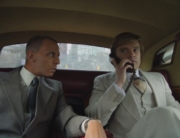![]() The opening montage of this intriguing biopic breezily goes through the conventional public story of the Beach Boys as they present the sunny California image of a harmonizing family band: the three Wilson brothers (Brian the ethereal-voiced songwriter; Carl on guitar; and Dennis the only surfer, on drums), cousin Mike Love on lead vocals, and their friend Al Jardine on guitar. They play hit songs, from “Surfin’ USA” to “I Get Around,” that catch the popularity wave in the early 1960s, dominating transistor radios, TV teen shows, and causing screaming fans to have “Fun, Fun, Fun.” Then in 1965, 23-year-old Brian (Paul Dano) has a massive panic attack on an airplane, begs off touring, retreats to the recording studio, and this absorbing look inside his creative and troubled mind begins in earnest.
The opening montage of this intriguing biopic breezily goes through the conventional public story of the Beach Boys as they present the sunny California image of a harmonizing family band: the three Wilson brothers (Brian the ethereal-voiced songwriter; Carl on guitar; and Dennis the only surfer, on drums), cousin Mike Love on lead vocals, and their friend Al Jardine on guitar. They play hit songs, from “Surfin’ USA” to “I Get Around,” that catch the popularity wave in the early 1960s, dominating transistor radios, TV teen shows, and causing screaming fans to have “Fun, Fun, Fun.” Then in 1965, 23-year-old Brian (Paul Dano) has a massive panic attack on an airplane, begs off touring, retreats to the recording studio, and this absorbing look inside his creative and troubled mind begins in earnest.
The fragility of that sensitive spirit is revealed in a flash-forward to 1986 in a Cadillac showroom, where an eccentric barefoot man (John Cusack) checks out an expensive car and introduces himself as Brian Wilson of the Beach Boys. (The script is co-written by Oren Moverman, who co-wrote Todd Haynes’ I’m Not There that splintered the personas of Bob Dylan.) The audacious back and forth in time and dual portrayal continues throughout and it works, especially as the years out of the public eye are explored.
Shifting from the tortured way Brian made beautiful music in the ’60’s, the film becomes a lovely and compelling love story, propelling the film to appeal to more than nostalgic fans. Elizabeth Banks is a very independent Melinda Ledbetter—wearing eye-catching outfits, bold jewelry, and high heels—confidently selling expensive cars to rich men. She combines the brass of Erin Brockovich with the supportive sensitivity of (the late) Alicia Nash in A Beautiful Mind. (Putting on costume designer Danny Glicker’s colorfully eye-catching, form-fitting outfits must have really helped Banks get into character.)
A return to the ’60’s offers a fascinating look at a diligent genius at work as Brian creates the groundbreaking Pet Sounds album. Going way beyond a greatest hits jukebox soundtrack, the imaginative score by Atticus Ross (co-composer of the innovative The Social Network soundtrack) weaves in threads of Beach Boys’ melodies with the sound design to get us inside musician’s head. Brian’s akin to Mozart in Amadeus, consumed with a heightened sense of sounds and rhythms that he painstakingly tries to replicate through instruments and voices in a recording studio, or else they will overwhelm his mind. While the other Beach Boys are on tour in Japan, Brian brings together a larger and larger group of rock, jazz, and classical instrumentalists, and the film fondly re-creates what is first-hand described in the documentary about the studio musicians of The Wrecking Crew. It also name-checks them for credit, particularly drummer Hal Blaine (Johnny Sneed) and bassist Carol Kaye (Teresa Cowles). Insisting on take after take, Brian is inspired to new experimentation because of his fiercely competition with the Beatles and the Wall of Sound producer, whose parallel Sturm und Drang was documented in The Agony And The Ecstasy of Phil Spector.
Brian frequently flashes further back to the belittling and violent abuse he suffered from his father, Murry (Bill Camp), to the point of being beaten almost deaf in one ear. (A 1990 TV movie and a 2000 miniseries, with Kevin Dunn as the demanding father/manager, detailed the dark clouds behind the summery music.) After the charming Melinda starts dating him, their relationship is menaced by another father-figure directing his life, the mercurial therapist Eugene Landy (Paul Giamatti), and the vulnerable Brian sometimes hears the interchanging voices of these two domineering men. Dr. Landy takes credit for reviving him in 1970 from a breakdown, but Melinda slowly and scarily finds Landy is isolating him and controlling everything in his life. Then he tries to bully her.
Back to 1966, the other Beach Boys return to layer their angelic voices onto the complex music Brian exhaustively shapes, and songs such as “I Just Wasn’t Made for These Times” and even “Wouldn’t It Be Nice” take on powerful psychological insight into his feelings. (To me, growing up with these tunes, they were just teen angst and dreams.) As the others’ patience starts to wear thin, Mike Love (Jake Abel) becomes something of a third villain, complaining about the sad lyrics and reprising Murry’s nagging over the lack of hits. But his pushing helps bring forth the glorious weirdness of the irresistible “Good Vibrations,” the lead single for the Smile album Brian leaves unfinished as he loses his grip on reality.
Forward into the 1990s, Dr. Landry’s pharmaceutical, financial, and legal manipulations and browbeating continue to keep Brian a prisoner. If this weren’t a true story, and made with the consulting cooperation of Brian and Melinda, this bizarre hijacking would be hard to believe. The audience will cheer her efforts, along with a concerned housekeeper, to free and heal him. Yes, dear viewer, she married him, and you will want to hear his victoriously completed Smile.







Leave A Comment